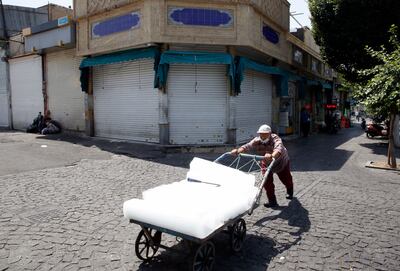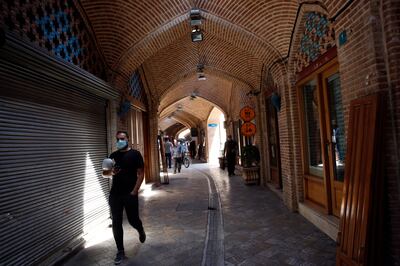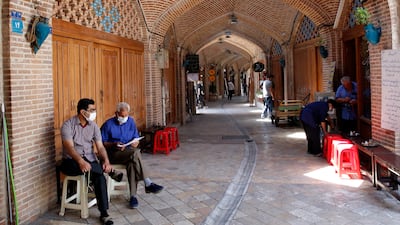President Hassan Rouhani on Tuesday offered the Iranian people a rare apology after days of public anger at the worst power cuts in recent years.
They came as the country sweltered in blazing summer temperatures.
Mr Rouhani acknowledged that the power cuts over the past week had caused "plenty of pain".
"I apologise to our dear people who have faced problems and suffering in the past few days and I urge them to co-operate [by curbing power use]. People complain about power outages and they are right," Mr Rouhani said on state TV.
"The Energy Ministry is not at fault ... but the minister should come and explain to the people what the problem is, and we have to find a solution."
Iranians across the country took to the streets again on Monday night in frustration at the power cuts that have left neighbourhoods without light and caused road chaos as traffic lights stop working and the capital's metro ground to a halt.
Businesses and factories have shut and telecoms systems have failed, leaving landlines useless and mobile phone signals weak.

Some towns in the north reported limited access to water because the power cuts affected supply.
Officials have blamed the power cuts on the country’s stifling heat, escalating electricity demand and deepening drought that has threatened to curtail hydroelectric generation.
Protesters outside the Electricity Ministry's offices in several Iranian cities called for accountability and demanded answers.
Videos on social media, shared widely by groups outside the country, showed dozens of people gathering in Tehran and other cities. Some blocked the streets and set fire to canisters while chanting slogans against supreme leader Ayatollah Ali Khamenei.
For such anger to be directed at the country's leadership is rare. In the past, the government has cracked down on dissent with an iron fist.
Many demanded the resignation of Energy Minister Reza Ardakanian.
“Ardakanian is an incompetent minister, shame on you,” protesters chanted in one video.
The power cuts, which began on Saturday night in Tehran and the surrounding cities, fuelled anger, especially as temperatures hit 41°C in the capital and other major cities. In Iran's southern deserts, 50°C was recorded.
As demand rose, driven by AC units and fans, the government implemented a rolling blackout to ration power.
Demand peaked in recent days at 66,000 megawatts, surpassing the country’s practical generating capacity of 65,000MW. Production capacity is often lower than 65,000MW, however, given Iran's ageing infrastructure.
Mr Rouhani said rainfall decreased by almost 50 per cent in the past year, leaving hydroelectric dams with shrinking water supplies to power the country. Hydroelectric power generation has plummeted to 7,000MW, he said, down from an estimated average of 12,000MW in recent years.
“When it becomes warm during a drought, we face problems in the time of peak [energy demand],” Mr Rouhani said. He acknowledged that power cuts were "seriously affecting people, businesses, factories and hospitals".
Last month, Iran’s sole nuclear power plant underwent an unprecedented emergency shutdown. The plant in the southern port city of Bushehr came back on line at the weekend after engineers said they repaired a broken generator.

Mostafa Nakhai, the spokesman for Iran’s parliamentary energy committee, said the situation was unlikely to change any time soon.
“This is not limited to one day,” he said. “We will have this situation for at least one month or more.”
The power cuts reportedly stopped the government’s symbolic clock that counts down to the supposed date of Israel's destruction, The Jerusalem Post reported.
The clock counts to a date in 2040 and was erected after the supreme leader said in 2015 that the “Zionist regime will cease to exist in the next 25 years”.
With an economy hit hard by US sanctions and the worst Covid-19 pandemic outbreak in the Middle East, Iran has faced nearly continuous protests by workers and pensioners for months over an inflation rate of more than 50 per cent, high unemployment and unpaid wages.
Lorry drivers in the northern city of Rasht parked their vehicles in the middle of the road to block traffic over the authorities' failure to address their problems.
After 42 years, officials remain unable to resolve the country's power problems, one Iranian said on Twitter.
“Under the excuse of electricity generation you build nuclear plants, but you also put Iran under sanctions … Shame on the officials,” the user said.
Iran’s parliamentary Speaker, Mohammad Qalibaf, said the power crisis the country is experiencing requires "planning and management" so that people's lives are not disrupted.
"If the increase in consumption and excess demand is not compensated in the short term for any reason, at least stick to the announced power-cut schedule so that people can plan for problems," Mr Qalibaf said in what was regarded as a criticism of the government.
Last week, thousands of workers in Iran’s energy sector held protests to demand higher wages and better working conditions in the country's southern gas fields and some refineries in major cities.
Workers with temporary hiring contracts “stayed home” to press for higher wages in Assaluyeh, Iran's main gas production centre on the Gulf, the semi-official Iranian Labour News Agency said.
“Since we learnt of the labour actions and their salary and benefit demands … the issues are being seriously followed up in [parliament's] Energy Commission,” Mousa Ahmadi, an MP whose district includes Assaluyeh, told the agency.
Iran held a presidential election last month, which was won by hardline judiciary chief Ebrahim Raisi, who will take office in August. He will replace Mr Rouhani, who has held office since 2013.
Additional reporting by agencies.


